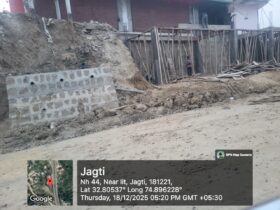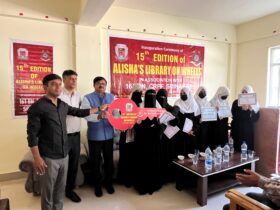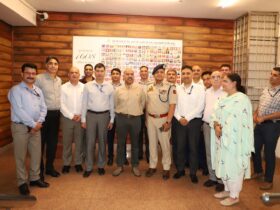A write-up piece by Late. Hakim Mohammad Sadiq
There are fifteen languages which are shown in the Eighth Schedule of the Indian Constitution. These are:
(1) Assamese (2) Bengali (3) Gujarati (4) Hindi (5) Kannada (6) Kashmiri (7) Malayalam (8) Marathi (9) Oriya (10) Punjabi (11) Sanskrit (12) Sindhi (13) Tamil (14) Telugu (15) Urdu
To put the Kashmiri language in the Eighth Schedule of the Indian Constitution, does, by itself constitute an event of great significance in the History of this language. This is realisable from the fact that about 800 languages and dialects are spoken in India. Out of these languages and dialects, the Indian Constitution has only recognised fifteen Indian languages apart from English. It then by itself shows the distinctive status given to the Kashmiri language by its being placed in the Eighth Schedule of the Indian Constitution. In effect, such recognition has not only put the Kashmiri language at par with other comparatively highly developed 14 schedule language of India, but has secured a constitutional recognition for its literature, culture, history and nationality.
What now remain to be realised by the Kashmiri speaking people, is the far-reaching effects and deep and profound changes that are to follow this constitutional recognition of this language as one of the languages in the Eighth Schedule. They further need to become fully acquainted how in conse quence of its inclusion in the Eighth Schedule of the Constitution, it has been given a significant role to play in Kashmiri society. Above all they need to make now full and earnest efforts to enrich this language to enable it to stand the test of serving as a medium for the communication of knowledge —literary, cultural, technical and legal in the region of Kashmir.
II) – Appointment of Official Language (Legislative) Common
Now pursuant to the order dated 27th April, 1960, of the president, a Standing Commission of legal experts, known as Official Language (Legislative) Commission was set up for the proper planning and implementation of entire work, relating to the preparation of a standard legal terminology for use, as far as possible in all official languages, and to arrange for the translation of the Central Acts, Ordinances and Regulations promulgated by the President and of the Indian Constitution in all the official languages enumerated in the eighth schedule of the Indian Constitution. This was of course a momentous decision, fraught with great and far reaching consequences for these official languages, in the sense, that for the first time an phrases — that too most difficult and abstract — in these regional languages. The task was by no means an easy one. It at once posed a challenge to the linguistic resources of these languages, to provide suitable phrases, terms and expressions to replace appropriately the corresponding English and Latin phrases, terms and expressions of the same intent. The legal experts, linguists and scholars of most of the regional official languages, however, took up the challenge and addressed themselves to this onerous task, which required ceaseless, tire-some and stupendous efforts to its accomplishment. The following inspiring message of the Official Language Commission was before them for their encouragement -The variety of Indian linguistic media is not national skelton to be ashamed of and to be somehow hidden away It is a wealth of inheritance in keeping with the continental size, ancient history and the distinctive tradition of assimilating and harmonising diverse cultural and racial elements, of which this country can be justly proud. Indological research, hitherto only a scholarly pursuit for academicians, are now potent with practical moment of the highest consequence to this country. Here is a tremendous challenge to the Indian linguists and a like opportunity to help in forging linguistic ties to match and sustain the cultural and political unities of the community of Indian peoples. No-where in history could philologists and linguists have ever been called to a greater duty.”
III) – Setting up units in various regions.
The result was that in some of the States of these regional languages, centres or units were set up consisting of legal experts, linguists and scholars, to tap the linguistic resources and potentials of their languages, in order to meet the challenge of finding appropriate legal terminology to replace that of the English of the same intent. Some had misgivings in their minds about its success; and some regarded it impossible to accomplish. Nevertheless what looked impossible has been accomplished, that too within a few years. These languages, most of them, now rightly claim themselves and truly deserve to be acclaimed, as the richest language in the wealth of legal terminology and expressions which any language can justly boast to possess. It must, however, not be forgotten that be-hind this accomplishment lay the ceaseless and strenuous efforts of their legal experts, and the patient and painstaking research of their scholars, and through tapping of hidden and unknown linguistic wealth of all the Indian languages — Aryo-Indo and Dravidian — by its linguists. What is more this accomplishment has been so perfect and masterly, that the legal terms and words devised and fixed in these languages, are better expressive in concept, more befitting in form, softer in their intonation and easier in understanding than those of English and Latin languages of the same intent.
IV) – Appointment of a Kashmiri Member in Official Language (Legislative) Commission
This leads us to ask : what has been done or achieved in This the Kashmiri language? With the appointment of a Member, representing the Kashmiri language in the Official Language (Legislative) Commission, the work of translating the Indian Constitution has been taken up in hand here at the centre. It is hoped that soon there shall be set up a Unit in the State, consisting of legal experts, which shall be entrusted with the work of translating all the central laws and ordinances. The task is by no means an easy one. It is decidedly most challenging and formidable one. Nevertheless, we have the example before us, of the people of other regions, who once faced the same situation, but whose legal experts assisted by Scholars and linguists, succeeded at last to accomplish the task. Deriving t then our inspiration from, what all other languages enumerated in the Schedule Eight had achieved in similar situation. expecting all our legal experts, sarvants and linguists to apply their minds to this great task with zeal, vigour and dedication and fully believing and trusting the inherent potentialities and un-tapped linguistic resources of our mother tongue, it appears sure that the day will not be far off when our mother tongue would also be highly acclaimed, as the richest language in its wealth of legal terminology and expressions, of which every Kashmiri could justly be proud of.
V) – Benefits to the Kashmiri Language
The question now arises how the translation of the Constitution and the Central Laws into Kashmiri language will benefit the language and its people. The benefits are assuredly many and great. They are:-
(1) It will make the literature of this language to flourish. Our poets and writers should realize that in modern times even poetry and fiction are no longer limited to roses, nightingales, moonlight and kisses. In modem literature cull use is also made of legal. Scientific, technological and philosophical terms and words. A few random pages of the Volume Island by Aldous Huxley for example, yield the following words and phrases: Expertee judgement, categorical imperatives, trancendal unity, conceptional level, over responsive, ecology, logic, actualisation, mass consumption, nonverbal experiences, statistical averages etc.
(2) A language will, to keep alive, have to be of use at all levels of life’s activities and experiences. A lawyer must find it useful for expressing the most intricate ideas of law, a philosopher for most abstruse ideas of existential philosophy and a lover for singing to her beloved. If it falls into desuetude at one end, or the other, it ceases to live. In short a language in modern times, cannot survive unless it is used for all the purposes namely scientific, legal, literary and cultural. Non-use of a language for any one of these purposes is bound to it stunt. Such a language is sure to lose vitality and wither away.
(3) The translation of various legal terms, words, phrases and expressions into Kashmiri will mean fixing or specifying their exact connotations and concepts. In every highly developed modern language the exact concept of each and every word, term and expression is fixed and specified with the result the speakers or writer, in these languages are able to convey the exact concept which they intend. This is sadly lacking in most of Indian Languages, particularly in the Kashmiri language. Now all the translation of Central Laws in the official languages of Eighth Schedule shall, after their approval by the Official Language (Legislative) Commission, be authorized by the President under the Authorised Translations (Central Laws) Act, 1972. This will lead to an authorized fixation of the exact meaning or concept of each and every terms, word and expression used in the translations of the Central Acts. It will give a conceptional stability to the vocabulary of these languages. They will thus acquire a new shine of modernity.
(4) It makes it possible to switch over to this language as the language of courts. We have the example of some regions, where it has already been done. There, on the completion of the Central laws into regional languages, their respective regional languages have taken over as the language of their Courts upto the level of District Courts; and it is now demanded, that too in more and more insistent and forceful terms, that it should be raised to the level of High Courts. What is more, in these regions, the possession of legal knowledge in their own mother tongues has made such knowledge accessible to all and sundry of these regions. Such knowledge has now percolated and trickled down among the common masses. The effects of it are remarkable to note. The common masses can now themselves grapple with most of the legal problems; and can understandingly follow and well comprehend all the various proceedings of the courts. Thus the voice of Lord Macaulay, saying a long time ago, that no justice could be done unless it is done in a language understood by the judge and above all by the common people, which so far remained unheeded, has after all been heeded to and acted upon. Then what is further to be borne in mind, is that the democratic and socialistic set-up of country makes it as much essential to spread education in the field of laws as in the fields of science, technology and literature. It is imperative now for the overall progress of our country to dispel legal ignorance. The common masses must know law and their rights and duties there under. It is then they can become law-minded and thereby law abiding. This alone will also ensure the enhancing of the prestige and dignity of the courts and also effectuate, instilling of the respect for the law, in the minds of the common man.
(5) The task of translating the Constitution and the Central Laws, affords to the Kashmiri people a unique opportunity to plan and engineer the development of their mother language. This task, indeed, constitutes an ambitious linguistic project. As we know, the Indian Constitution is a most complex legal document, consisting as it does, thousands of such legal terms, expressions and idioms, as are of subtle shades of meaning and concepts, most profound. The same is of course true of all the central laws. To get all such terms, expressions and idioms into the Kashmiri language, with all their varied and subtle shades, of meaning and concept, will necessarily involve the processes of: coining new words from the existing resources of the language; devising new such terms by giving new concepts to the existing words, or terms; and assimilating or drawing from the vocabulary of other languages. All these processes will secure its enrichment and make the dimension of its vocabulary vast and varied. It will, no longer, be a language, emasculated and mutilated but one fun of grace and intellectual wealth. Apart from it, the new and modern grammatical conceptions regarding punctuation, lexical formation and sentence construction have to be introduced in this language, before the successful accomplishment of the task of translation can he hoped. Many other changes have to be introduced which may even be taking liberties with the language. But such liberties have to be taken, as has been taken in other regional languages, which in consequence have gained in depth and maturity. What is more, the growth of this language, in consequence of its indiscriminate assimilation from the contact languages-like Persian, Arabic, Urdu and English has been so far, like the growth of jungle, quite wild. The assimilated foreign words have now, to be given new musical overtones and receive a sort of lexical pruning and grammatical control to make them to fit in with known form, expression, style and genius of this language. This will make the language a highly developed modern language, which alone will be capable to dispel effectively and quickly the ignorance, superstitions and illiteracy—scientific, technological and legal of common masses of Kashmir.
VI) – Duty of our Scholars and Linguists
It is then quite obvious that success of this project is equally, as much the concern of our legal experts, as it is or should be of our scholars, educationists and linguists. They have before them, the inspiring example of Sir George A Grierson, 0.M., KC1E, Ph.D., D.LITT., LL.D., an eminent linguist who out of simple linguistic interest, has studied the language and done it an unforgettable service by the compilation of its first dictionary. Our linguists have greater cause than this English Lord to serve the language. It is their mother tongue or the language they use in their own homes, having acquired it from boyhood. It is the language they love, for it is in the orbit of this language that they have grown up, and it is through this that they receive their emotional fulfilment. This is the language then that must receive their first homage.
(The Author -Late. Hakim Mohammad Sadiq was the First and sole Kashmir Based Member Official Language (Legislative) Commission in Ministry of Law and Justice an this historic Write-up came after the 5 yrs of the completion of the Commission)


















Leave a Reply